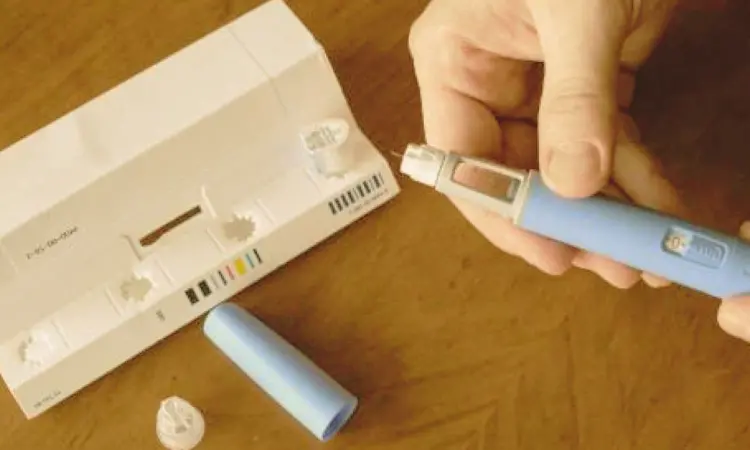- Home
- Medical news & Guidelines
- Anesthesiology
- Cardiology and CTVS
- Critical Care
- Dentistry
- Dermatology
- Diabetes and Endocrinology
- ENT
- Gastroenterology
- Medicine
- Nephrology
- Neurology
- Obstretics-Gynaecology
- Oncology
- Ophthalmology
- Orthopaedics
- Pediatrics-Neonatology
- Psychiatry
- Pulmonology
- Radiology
- Surgery
- Urology
- Laboratory Medicine
- Diet
- Nursing
- Paramedical
- Physiotherapy
- Health news
- Fact Check
- Bone Health Fact Check
- Brain Health Fact Check
- Cancer Related Fact Check
- Child Care Fact Check
- Dental and oral health fact check
- Diabetes and metabolic health fact check
- Diet and Nutrition Fact Check
- Eye and ENT Care Fact Check
- Fitness fact check
- Gut health fact check
- Heart health fact check
- Kidney health fact check
- Medical education fact check
- Men's health fact check
- Respiratory fact check
- Skin and hair care fact check
- Vaccine and Immunization fact check
- Women's health fact check
- AYUSH
- State News
- Andaman and Nicobar Islands
- Andhra Pradesh
- Arunachal Pradesh
- Assam
- Bihar
- Chandigarh
- Chattisgarh
- Dadra and Nagar Haveli
- Daman and Diu
- Delhi
- Goa
- Gujarat
- Haryana
- Himachal Pradesh
- Jammu & Kashmir
- Jharkhand
- Karnataka
- Kerala
- Ladakh
- Lakshadweep
- Madhya Pradesh
- Maharashtra
- Manipur
- Meghalaya
- Mizoram
- Nagaland
- Odisha
- Puducherry
- Punjab
- Rajasthan
- Sikkim
- Tamil Nadu
- Telangana
- Tripura
- Uttar Pradesh
- Uttrakhand
- West Bengal
- Medical Education
- Industry
Once-Weekly Semaglutide-Insulin Combo Matches Daily Basal-Bolus in Type 2 Diabetes Control: Study

According to a Phase 3 trial published in The Lancet Diabetes & Endocrinology, a once-weekly combination of semaglutide and insulin icodec was noninferior to traditional daily basal-bolus therapy in lowering A1C levels in patients with type 2 diabetes not adequately controlled with daily basal insulin. The combination also led to greater weight loss, lower total weekly insulin requirements, and fewer hypoglycemic events. The study was published by Prof Liana K. Billings and fellow researchers.
The COMBINE 3 trial was a 52-week open-label randomized, treat-to-target, multi-center trial that was carried out in 109 outpatient clinics and hospitals in 14 countries. It was designed to assess the non-inferiority of IcoSema compared to traditional BBT and to investigate if IcoSema would provide extra clinical benefits. Adults older than 18 years with type 2 diabetes not well controlled on daily basal insulin (HbA1c 7.0–10.0% or 53.0–85.8 mmol/mol) taking 20–80 units of daily insulin were included. Participants were allocated at random to receive once-weekly IcoSema or BBT, which included daily insulin glargine and two to four daily insulin aspart injections.
Results
• Of 844 people screened from November 2021 through September 2022, 679 were recruited (mean age 59.6 years; 59% male).
By week 52, both treatment groups had significant HbA1c reductions:
• IcoSema group: −1.47 percentage points (SE 0.05; equivalent to −16.0 mmol/mol)
• BBT group: −1.40 percentage points (SE 0.06; −15.3 mmol/mol)
• The estimated treatment difference was −0.06 percentage points (95% CI −0.22 to 0.09), establishing non-inferiority of IcoSema (p<0.0001).
Superiority was evident with other outcomes, in particular:
• Weight Loss: IcoSema resulted in a mean bodyweight loss of −6.72 kg (95% CI −7.58 to −5.86; p<0.0001) versus BBT
• Insulin Dose: Weekly total insulin dose was lower with IcoSema (ETD −270 units; 95% CI −303 to −236; p<0.0001)
• Hypoglycemia Rates: The incidence of clinically significant or severe hypoglycemic events was 0.21 per person-year with IcoSema compared with 2.23 using BBT (rate ratio 0.12; 95% CI 0.08 to 0.17; p<0.0001)
Safety analyses revealed contrasting adverse event profiles for the two regimens:
• In the IcoSema group, gastrointestinal disorders were the most frequent adverse events, occurring in 44% of participants (148 out of 340 individuals, with 443 events reported).
• By comparison, BBT participants had infections and infestations more often, at 35% (116 out of 328 participants with 193 events).
Weekly IcoSema showed non-inferior glycemic control and better outcomes in body weight reduction, reduction in insulin dose, and rate of hypoglycemia compared to basal-bolus treatment. The trial favors IcoSema as a viable, more convenient, and safer alternative for treating adults with type 2 diabetes needing intensification over basal insulin.
Reference:
Billings, L. K., Andreozzi, F., Frederiksen, M., Gourdy, P., Gowda, A., Ji, L., Pletsch-Borba, L., Suzuki, R., Unnikrishnan, A. G., & Vianna, A. G. D. (2025). Once-weekly IcoSema versus multiple daily insulin injections in type 2 diabetes management (COMBINE 3): an open-label, multicentre, treat-to-target, non-inferiority, randomised, phase 3a trial. The Lancet. Diabetes & Endocrinology, 13(7), 556–567. https://doi.org/10.1016/S2213-8587(25)00052-X
Dr Riya Dave has completed dentistry from Gujarat University in 2022. She is a dentist and accomplished medical and scientific writer known for her commitment to bridging the gap between clinical expertise and accessible healthcare information. She has been actively involved in writing blogs related to health and wellness.
Dr Kamal Kant Kohli-MBBS, DTCD- a chest specialist with more than 30 years of practice and a flair for writing clinical articles, Dr Kamal Kant Kohli joined Medical Dialogues as a Chief Editor of Medical News. Besides writing articles, as an editor, he proofreads and verifies all the medical content published on Medical Dialogues including those coming from journals, studies,medical conferences,guidelines etc. Email: drkohli@medicaldialogues.in. Contact no. 011-43720751


